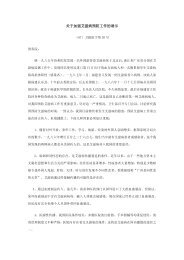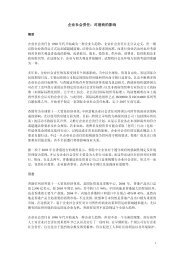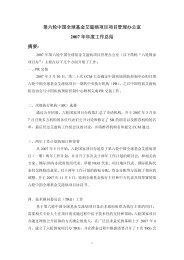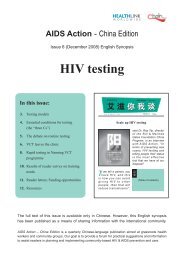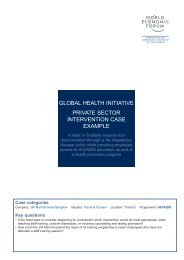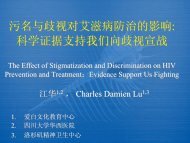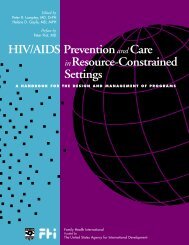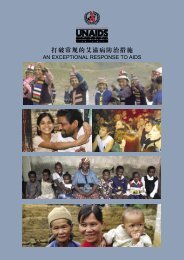The Training of Trainers Manual - UNFPA
The Training of Trainers Manual - UNFPA
The Training of Trainers Manual - UNFPA
You also want an ePaper? Increase the reach of your titles
YUMPU automatically turns print PDFs into web optimized ePapers that Google loves.
7. HIV can also be transmitted when the skin is cut or pierced with an unsterilized needle, syringe,<br />
razor blade, knife, or any other tool. People who inject themselves with drugs are at high risk <strong>of</strong><br />
becoming infected with HIV/AIDS. In Eastern Europe and Central Asia, the sharing <strong>of</strong> contaminated<br />
needles among injecting drug users is currently responsible for the majority <strong>of</strong> infections. Moreover,<br />
drug use alters people’s judgement and can lead to risky sexual behaviour, such as not using<br />
condoms. Intravenous (injecting) drug users should always use a clean needle and never use another<br />
person’s needle or syringe. If you know or suspect your sexual partner to be injecting drugs, you<br />
should never have unprotected sex.<br />
8. Anyone who suspects that he or she might have been infected with HIV should contact a health<br />
worker or an HIV/AIDS centre in order to receive confidential counselling and testing.<br />
HIV tests can identify HIV antibodies in the blood as early as two weeks after infection, but the<br />
body may take up to six months to make a measurable amount <strong>of</strong> antibodies. This period <strong>of</strong> time<br />
is known as the ‘window period’. <strong>The</strong> average time is 25 days. A positive result on an HIV test<br />
means that HIV antibodies are present in your bloodstream and that the person is HIV positive. <strong>The</strong><br />
onset <strong>of</strong> AIDS may take up to ten or more years. Remember – it is possible to live a productive and<br />
healthy life as a person living with HIV/AIDS.<br />
A negative result on an HIV test usually indicates that the person is not infected with HIV. However,<br />
re-test after six months is suggested if the person engaged in high-risk behaviour during the past six<br />
months, because it can take this long for the immune system to produce enough antibodies<br />
to be detected.<br />
9. HIV is not transmitted by casual, everyday contact: hugs or handshakes; swimming pools;<br />
toilet seats; shared bed linen, eating utensils, or food; mosquito and other insect bites; or<br />
coughing or sneezing.<br />
10. Discriminating against people who are infected with HIV/AIDS or anyone thought to be at risk <strong>of</strong><br />
infection violates individual human rights and endangers public health. Everyone infected with and<br />
affected by HIV/AIDS deserves compassion and support.<br />
178 <strong>Training</strong> <strong>of</strong> <strong>Trainers</strong> <strong>Manual</strong>



